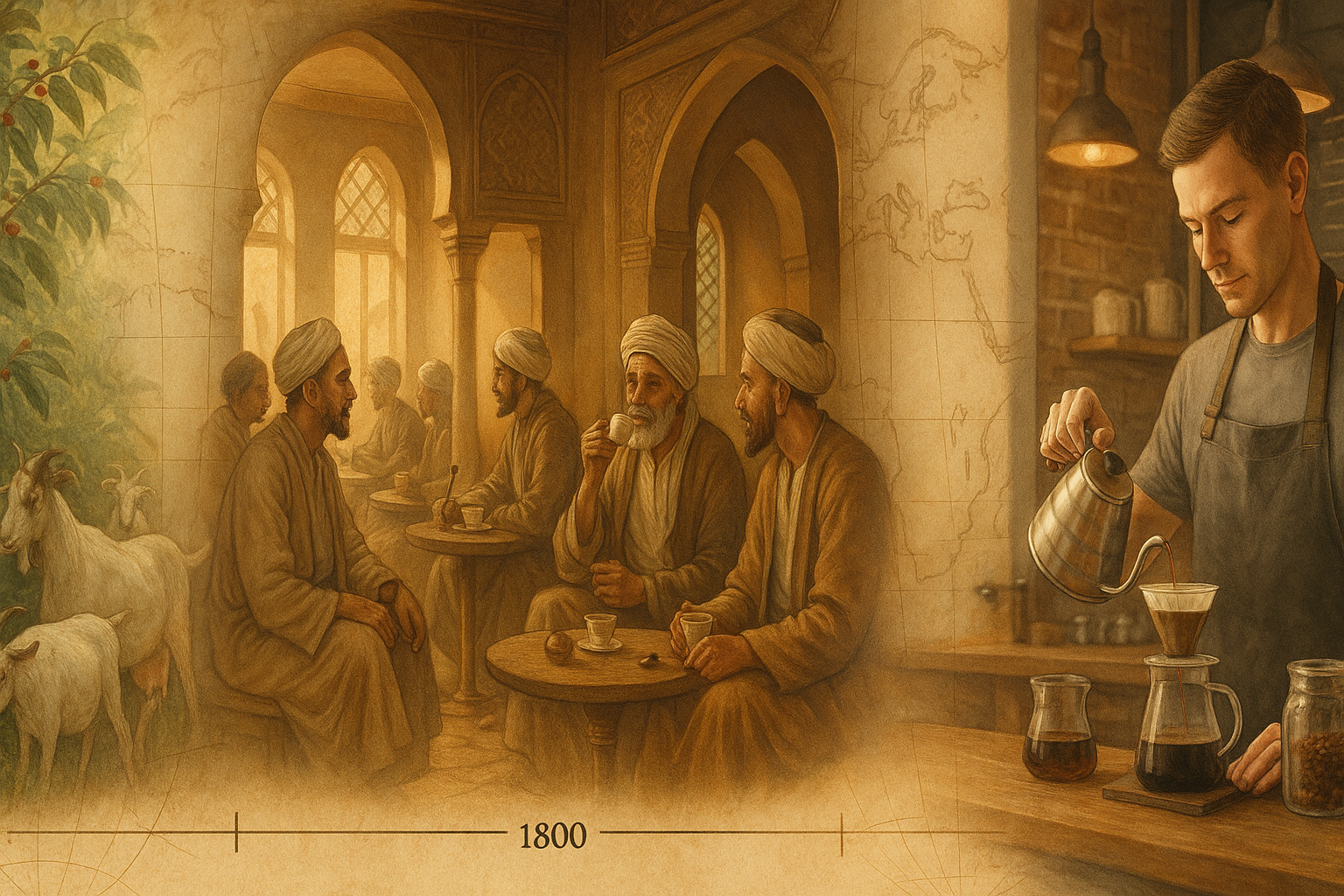Coffee is more than just a drink—it’s a global cultural phenomenon with a rich and captivating history. From ancient Ethiopian legends to modern specialty cafés, coffee has fueled revolutions, inspired art, and brought people together across centuries.
In this article, we’ll explore the history of coffee, tracing its journey from wild plant to global staple. Whether you’re a casual drinker or a passionate barista, these facts will deepen your appreciation for every cup.
1. Coffee’s Mythical Origins: Kaldi and the Dancing Goats
Legend has it that coffee was discovered by an Ethiopian goat herder named Kaldi in the 9th century. He noticed his goats became energetic and lively after eating red berries from a certain bush. Curious, Kaldi tried the berries himself—and the effects were immediate.
Monks from a nearby monastery experimented with the berries, boiling them to stay awake during prayers. This was possibly the first primitive coffee drink ever made.
2. Coffee Spreads Through the Arab World
By the 15th century, coffee cultivation and trade had begun in Yemen, where Sufi monks used it to stay alert during spiritual practices. From there, it spread across the Middle East—to Persia, Egypt, and the Ottoman Empire.
Coffee houses, known as qahveh khaneh, began appearing in major cities. They became centers of conversation, music, games, and intellectual debate—early versions of modern cafés.
3. The Rise of Coffee Culture in Europe
Coffee arrived in Europe during the 17th century, first through Venetian traders and Ottoman diplomats.
- In Italy, coffee gained acceptance after Pope Clement VIII allegedly blessed it.
- In England, coffee houses were called “penny universities” because, for the price of a penny, one could engage in spirited conversation and gain knowledge.
- In France, coffee culture flourished in Parisian cafés, influencing literature and politics.
4. Coffee and the Age of Revolution
Coffee houses became hotbeds of revolutionary thought:
- In England, the Lloyd’s Coffee House became the foundation of what we now know as Lloyd’s of London (insurance market).
- In America, coffee replaced tea during the Boston Tea Party in 1773, becoming a symbol of independence.
Coffee was no longer just a drink—it was a political and intellectual fuel.
5. The Global Expansion of Coffee Cultivation
As demand exploded, colonial powers began cultivating coffee in other parts of the world:
- Dutch traders brought coffee to Java (Indonesia) in the 1600s.
- The French introduced it to the Caribbean (Martinique).
- The Portuguese spread it to Brazil, which would become the world’s largest coffee producer.
This expansion, while economically vital, was also tied to colonization and exploitation—especially through forced labor and plantations.
6. Invention of Espresso and Modern Brewing
- In 1901, Luigi Bezzera created the first espresso machine in Italy, paving the way for fast, strong coffee.
- The 20th century saw the rise of instant coffee, coffee pods, and specialty brews.
Modern coffee culture evolved from convenience to craftsmanship, emphasizing:
- Fresh roasting
- Bean origin
- Brewing methods like pour-over, AeroPress, and siphon
7. Coffee in Pop Culture
Coffee appears in literature, music, and film as a symbol of energy, thought, and connection:
- Writers like Balzac and Hemingway were famous coffee drinkers.
- TV shows like Friends and Gilmore Girls centered scenes around cafés.
- Coffeehouses remain symbols of creativity and discussion.
8. The Rise of Third Wave Coffee
The Third Wave Coffee Movement began in the early 2000s and focused on treating coffee as an artisanal product, like wine.
Key principles:
- Transparency in sourcing
- Ethical, sustainable farming
- Brewing as a science and art
This wave brought more attention to:
- Direct trade
- Single-origin beans
- Specialty cafés with expert baristas
9. Coffee Today: Global Impact
- Over 2 billion cups of coffee are consumed daily worldwide.
- It’s the second most traded commodity after oil.
- The industry supports millions of farmers, especially in developing countries.
Yet challenges remain:
- Climate change affects bean production
- Fair wages and sustainability are ongoing concerns
Final Sip: From Ancient Legend to Daily Ritual
Coffee has journeyed through continents, cultures, and centuries—connecting people, igniting ideas, and fueling revolutions. The next time you sip your cup, remember:
✅ You’re part of a rich tradition
✅ That cup has global roots
✅ And its history is still being brewed
Coffee isn’t just a beverage—it’s a story, a culture, and a legacy.
